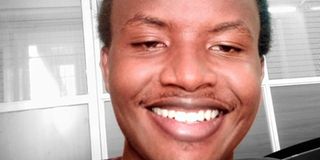Book Club: Non-fiction book readers

Geoffrey Tegeret, Digital Marketing and Sales. Photo | Pool
What you need to know:
We are currently reading, Barking Up the Wrong Tree by Erick Barker. The book argues against what we are taught about success.
I am an avid reader. I read an average of two books every month. With the many responsibilities and duties that I have to undertake, which include running a social media page where I post what I have read, I am intentional about creating time to read.
For instance, I read for at least 30 minutes in the morning and in the evening before my downtime.
A few months ago, I formed a WhatsApp group with the intention of interacting, knowing what other readers are reading, and getting ideas for books that I should read. Interestingly, we've never given our group a specific name but since we are non-fiction book readers, I think the name befits us.
We are currently 14 members in the group and, we only read non-fiction books.
Members suggest books and their descriptions and then we vote on Google forms until we reach a unanimous decision on one book. We give ourselves two weeks to get through the particular book. Then we meet on Zoom to discuss the takeaways from the book before we pick the next read.
We are currently reading, Barking Up the Wrong Tree by Erick Barker. The book argues against what we are taught about success.
Some of the lessons I've learnt are that we have two kinds of leaders— filtered and unfiltered. The filtered leaders climb the ranks in their respective fields until they reach the pinnacle of leadership and success, but they rarely enact great changes as they have been growing in a silo and following the rules of their organisations and can barely think outside the box.
Unfiltered leaders like Abraham Lincoln and P.M Winston Churchill shake up the world and bring about ginormous positive change.
Abraham Lincoln was the first Western leader to push for the abolishment of the slave trade which he succeeded in achieving whilst Winston Churchill successfully led Britain through World War II.
One last lesson I've learnt from the book is that individuals with extreme creativity have been linked to being neurodivergent which is the opposite of normal, and that we should embrace them in our organisations. An example is the Israeli military, which took in autistic people because they had the ability to study satellite images for hours on end without getting bored something neurotypical(normal) individuals weren't able to do.
While autistics may struggle with personal interaction, many excel at visual tasks like puzzles. And they’ve proven themselves a great asset in the Israeli’s national defense.





